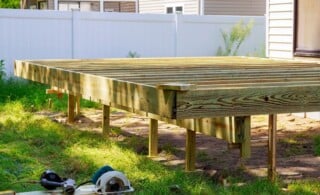
Every construction project has potential pitfalls. But when doing work on an HOA home, there are HOA-specific snags that can derail the project. Learn the top 3 pitfalls of HOA projects, and how to stop them before they start.
1. Off-hours noise
Most HOAs have rules about when it’s okay to make construction noise (think power tools and trucks). These hours are usually from 7 am to 7 pm Monday through Friday, and 9 am to 9 pm on weekends.
Why this rule? Because your HOA neighbors may need to put their kids to bed at a decent hour and enjoy a peaceful night’s sleep themselves. If your contractors are making noise outside of these hours, you could end up with angry neighbors and unwanted attention from your HOA. Your HOA might intervene in ways that slow down or stop your project. Or, you may wind up with a fine.
Avoid Noise Complaints
- Send your contractor the noise guidelines of your HOA.
- If you’re not living in the home at the time of construction, you might not realize that contractors are hammering and sawing away outside the approved hours. Give your neighbors your contact info, so they can let you know right away if workers are making a racket after dark.
2. Construction materials, vehicles and dumpsters that overstay their welcome
If you’re doing a massive renovation, it’s likely you’ll have a dumpster parked in your driveway at some point. There also might be contractor materials and equipment outside, and vendor trucks parked on the street. These are all expected aspects of a project, and it’s understandable that the site might be a bit of an eyesore for a while.
The problem is when trucks or dumpsters linger beyond the expected timeframe. Maybe it’s a dumpster that stays in the driveway for months. Or a worker’s truck that’s often parked on the street till 11 pm. Or untidy piles of materials on the lawn.
Neighbors may complain to the HOA about the breach of etiquette or violation of HOA rules. The HOA might intervene and force you to do something about the unsightly issue, and/or they could fine you. Once you’ve drawn the HOA’s attention, they can easily go from relatively hands-off to keeping a close eye on the rest of the project.
Don’t get caught with your garbage truck out.
- Check your HOA’s CC&Rs (covenants, conditions & restrictions) for rules about dumpsters, material storage and worker vehicles.
- Ask contractors to tidy up the worksite when the day’s work is done. They should make sure equipment, materials, and debris are properly stored before everyone goes home.
3. Misunderstandings with contractors
You and your qualified contractor share the same goal—to complete your renovation or repair to your satisfaction, on schedule and within budget. But you and your team may have different ideas about how you’ll reach that goal, and that’s where misunderstandings and conflict can arise.
Maybe you assume the kitchen remodel will be done in two months while the contractors are thinking four months? Maybe workers assume that they’re free to reroute the waterline without HOA approval, but you know that’s not the case? Assumptions can lead to misunderstandings about renovation or remodeling objectives. The good news is, you can avoid expensive hiccups like project delays or work that needs to be redone.
Avoid making any assumptions.
- Get in sync with all your contractors before any work begins.
- Review the project schedule, CC&R guidelines, and costs.
- Don’t assume that your contractor is more familiar with your HOA than you are.
- Oversee the day-to-day, even if you hire a project manager, it’s your responsibility to make sure the project is HOA-compliant.
- Check on the project frequently, to identify any problems and get things back on track.
Hire qualified, professionals. Working with experienced pros, you’re less likely to run into communication issues.
Communication is your friend
In general, you can steer clear of many home improvement pitfalls by communicating well with your neighbors, HOA and contractors. You may not be required to inform neighbors of an upcoming project, but it’s a nice gesture of goodwill and can prevent future complaints.
Encourage neighbors to approach you first if anything becomes a problem, versus going straight to the HOA. Make sure your HOA knows about your project plan, and get HOA board pre-approval, if it’s required. See more HOA renovation dos and don’ts >
FAQs
Can I access another owner’s home to complete my renovation?
Let’s say you need to get at the water line as part of your bathroom remodel, but it’s only accessible from your downstairs neighbor’s ceiling. It’s generally permitted to access someone else’s unit in cases like these. The HOA has what’s called an “easement right” to all owner units for maintenance and approved renovations. Check your HOA’s CC&Rs to learn your association’s rules regarding this.
If you find out that it’s allowed, the next step is to reach out directly to your neighbor to let them know about the project and arrange the work. You’ll pay for the work, and repairs to your neighbor’s property that result from damage caused by your project.
What’s the difference between HOAs CC&Rs and HOA Rules & Regulations?
Both of these documents cover the rules of your HOA. The difference is that the CC&Rs (covenants, conditions & restrictions) are legal documents written by a lawyer. The Rules & Regulations are written by the HOA board, and often act as a supplement to the CC&Rs—they address anything not covered in the CC&Rs. The Rules & Regulations can be updated with a board vote, whereas the CC&Rs can only be updated by a lawyer.
What is a deed restriction? How does it differ from the CC&Rs?
As you plan your renovation or repair, you might come across the term “deed restriction.” Deed restrictions and CC&Rs are similar in that both restrict the use of or activities on property. The main difference is that the term for these when we’re talking HOAs is CC&Rs. In a non-HOA property, these rules are called deed restrictions.
 JSP Toolbox is an online suite of tools and resources that empowers homeowner associations (HOAs) to manage themselves, easily and affordably. Learn more about JSP Toolbox
JSP Toolbox is an online suite of tools and resources that empowers homeowner associations (HOAs) to manage themselves, easily and affordably. Learn more about JSP Toolbox When and Why You Need Experts to Lift and Move Heavy Items at Home
When and Why You Need Experts to Lift and Move Heavy Items at Home  Home Fitness: How to Choose Exercise Equipment and Where to Place It
Home Fitness: How to Choose Exercise Equipment and Where to Place It  Homeowners Association Rules: Which Renovations Require HOA Board Approval?
Homeowners Association Rules: Which Renovations Require HOA Board Approval?  HOA Guidelines: Renovation Do’s and Don’ts
HOA Guidelines: Renovation Do’s and Don’ts 

Are You Familiar With This Topic? Share Your Experience.